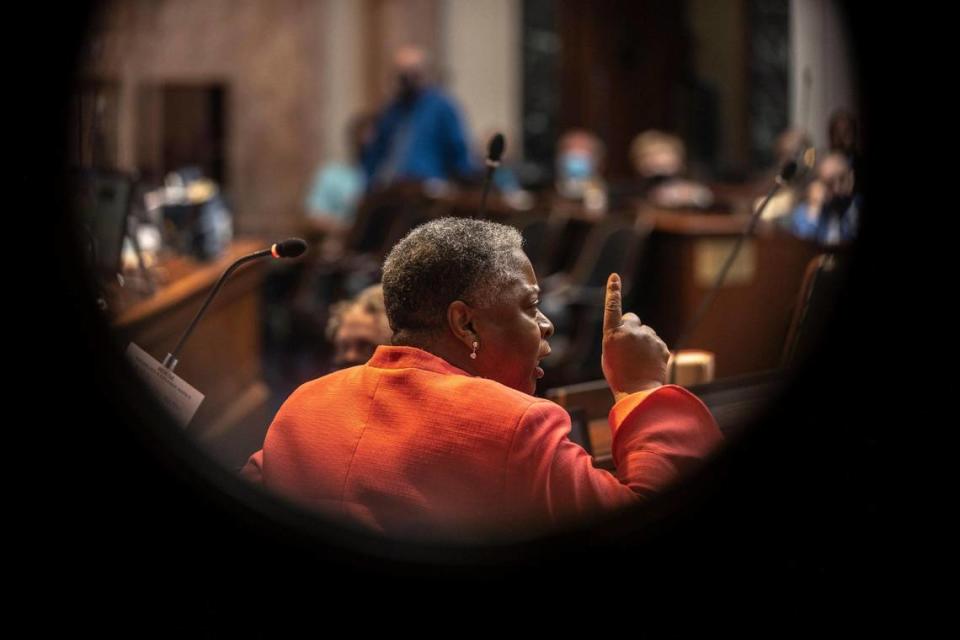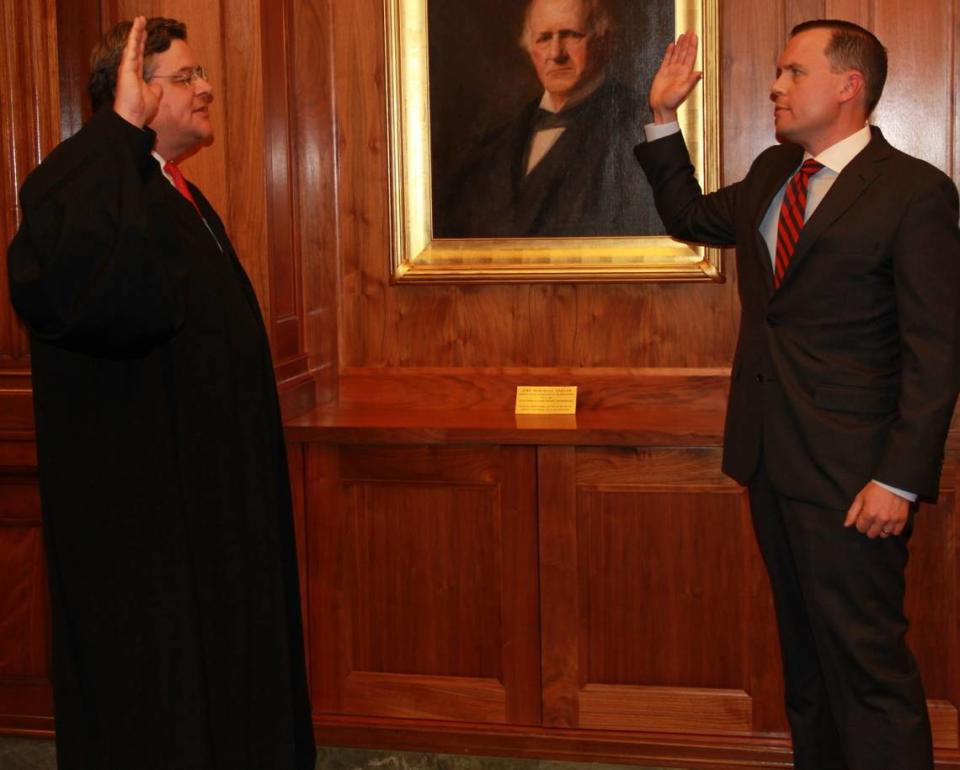For KY attorney general, it’s Trump-appointed prosecutor vs. retired Air Force colonel
- Oops!Something went wrong.Please try again later.
- Oops!Something went wrong.Please try again later.
- Oops!Something went wrong.Please try again later.
- Oops!Something went wrong.Please try again later.
- Oops!Something went wrong.Please try again later.
Like most people, the state of Kentucky has a lawyer, the attorney general, to advise it on legal matters and represent it when it goes to court.
Voters on Nov. 7 get to hire a new one because the Republican incumbent, Daniel Cameron, is running for governor.
In fact, most of the recent attorneys general have run for governor, including Democratic Gov. Andy Beshear, now seeking a second term. The job of attorney general is widely seen as a stepping stone to the Governor’s Mansion for ambitious young politicians.
Given those stakes, when attorneys general and governors come from opposing parties — as they usually have in Kentucky since 2004 — they act less like lawyer and client and more like bitter rivals.
One of Cameron’s campaign themes this year is how often he has sued Beshear, to block Beshear’s COVID-19 public health restrictions, for example, and to promote the legislature’s abortion restrictions despite Beshear’s opposition.
So, who steps into the arena next?
Democrats this year nominated state Rep. Pamela Stevenson of Louisville. Stevenson is a retired U.S. Air Force colonel and judge advocate general, or a military lawyer. After leaving the service in 2011, she founded a nonprofit law firm in southern Indiana to assist senior citizens, veterans and families.
Stevenson gained national attention earlier this year with a passionate speech opposing an omnibus measure against transgender youths. Rising angrily in the House, she chastised her Republican colleagues, who control the legislature, for repeatedly putting a target on transgender youths throughout the legislative session.
“We have created an environment of hate!” Stevenson shouted during the House floor debate.
“And then we look at them like there’s something wrong with them!” she continued. “First you hated Black people. Then you hated Jews. Now you’re hating everybody! So the question is when the only people left are you, will you hate yourself? Power concedes nothing!”
Republicans picked Louisville lawyer and lobbyist Russell Coleman, whom President Donald Trump appointed as U.S. Attorney for the Western District of Kentucky during his administration. Coleman also previously worked as legal counsel for U.S. Senate Republican Leader Mitch McConnell of Kentucky, where he met and mentored a University of Louisville intern named Daniel Cameron. The two men, now sharing the statewide ballot, remain close friends.
Although Coleman is a former federal prosecutor and Trump has been indicted four times this year on serious criminal charges, Coleman has campaigned on his connection to the ex-president. He touts the “Trump/Coleman approach” to law enforcement.
In August 2022, FBI agents searched Trump’s Mar-A-Lago estate in Florida to recover hundreds of classified documents, some related to U.S. intelligence on foreign countries, leading to one of the indictments against him. Coleman — himself a former FBI agent — issued a statement of sympathy for the man who appointed him.
“All we know is there’s a dispute over paperwork, which to many Americans would make a raid seem like politically motivated overkill,” Coleman said at the time.
Coleman and Stevenson both have enough money to air television commercials, but he has a lot more than her.
As of their Oct. 11 campaign-finance reports, Coleman disclosed just over $1 million in receipts and $888,280 cash on hand — much of it from the network of Washington and Frankfort lobbyists and political action committees that typically back former McConnell aides when they seek elected office. Some PACs donating to Coleman represent industries, like utilities and health care, that he would be required to watchdog as attorney general.
Stevenson reported $287,012 in receipts and $43,752 on hand, often in smaller donations of $10 to $50.
The attorney general employs about 200 people in Frankfort and branch offices across the state.
Among its duties, it supports local prosecutors and handles criminal appeals; it helps distribute hundreds of millions of dollars from the national opioid settlement; it represents ratepayers when utilities ask to raise their prices before the Public Service Commission; it investigates consumer fraud; and it decides whether the state’s open records and open meetings laws have been violated by public officials.
Pamela Stevenson, the Democrat
Stevenson was born and raised in Louisville. When she returned home after a career of globe-trotting with the Air Force, she started practicing law across the Ohio River in southern Indiana.
In 2020, she entered politics by winning a Kentucky House seat. As a member of the shrunken Democratic minority, Stevenson’s role is mostly limited to fruitlessly protesting as the legislature’s Republican super-majority passes bills banning abortion, limiting food benefits for poor children and the like.

Her professional life, straddling the Kentucky/Indiana state line, created problems for her as she ran for attorney general.
Until this year, Stevenson was not licensed to practice law in Kentucky by the Kentucky Bar Association. She was licensed in Indiana. She recently sat for the necessary legal ethics exam, so her practice in Kentucky is “temporarily authorized pending admission” to the Kentucky Bar Association,” the KBA states.
The state Constitution does not require Kentucky’s attorney general to be a Kentucky lawyer. But the Coleman campaign enjoys pointing out that Stevenson wants to be the state’s top law officer without ever having tried a case inside a Kentucky courtroom. By contrast, Coleman has held a Kentucky law license for nearly 20 years.
In a recent interview with the Herald-Leader, Stevenson said her travels around Kentucky this year, speaking to voters, convinced her the attorney general’s office has been too “politicized.” Kentuckians are tired of hearing about their state’s top lawyer suing the president and the governor over ideological disagreements, she said.
“The commercial that he (Cameron) has, saying ‘I’ve sued Governor Beshear 27 times’?” she said. “Well, we still have children who are hungry and not being fed at school.”
“People just want their lives to work. And they ask some pretty straightforward questions, like, ‘Why do y’all talk about stuff that doesn’t matter to us?’” she said.
Stevenson said she would help make communities safer by securing more funding for law enforcement and drug addiction treatment programs. In different communities, she said, she would take her cues from what local leaders and residents tell her about their individual needs.
But just because she supports law enforcement doesn’t mean she always takes the side of police.
“I will not support anyone that are shooting innocent people for no reason, period,” she said. “I love police officers. We have got to have someone with authority to handle the squabbles that human beings get into. ... So I back them — and the professionals that I know deserve backing.”
Stevenson said she gained invaluable executive experience when she was deployed around the world in the Air Force, ordered to solve difficult problems as a commanding officer.
“They put me in some of the harshest places where I didn’t speak the language. Places where I was not wanted — (in) the Middle East, (as) a short, Black woman,” she said.
“They put me in those places to effect change for America. And the best way to effect change — they would ask me, ‘How are you always so successful, no matter where we send you?’ — it’s because I believe in partnerships. I believe in direct communication. And I believe in being accessible.”
Russell Coleman, the Republican
Coleman declined repeated requests to be interviewed for this article.
He grew up in several different communities around rural Western Kentucky, graduating from Logan County High School and, later, the University of Kentucky and UK law school.

Starting in 2004, Coleman spent more than five years as a special agent in the FBI and as a briefing coordinator to two attorneys general in the U.S. Department of Justice. His next five years were with McConnell in the Senate.
Before and after his time as Trump’s U.S. attorney for the Western District of Kentucky, Coleman has been a partner with the mega-firm of Frost Brown Todd, in its Louisville office. He both practices law — white-collar criminal defense, internal investigations — and lobbies in Washington and elsewhere for the firm’s CivicPoint government relations subsidiary.
Among Coleman’s lobbying clients have been various criminal-justice reform groups, including the U.S. Justice Action Network. In Kentucky and other states, he has urged earlier parole, better re-entry programs for former prison inmates and more addiction treatment in certain “common sense” cases, as he calls them.
In 2016, he testified before the Kentucky General Assembly in support of House Bill 40, which passed, allowing for the expungement of some felony records for an estimated 100,000 Kentuckians.
As U.S. attorney, Coleman was — like most prosecutors — willing to work out plea deals with more lenient sentences rather than bring every case into a courtroom for trial.
In a 2018 case he prosecuted, for example, Johnny Boone, 74, head of the so-called “Cornbread Mafia,” was sentenced to federal prison for nearly five years for a large marijuana growing operation found on his Washington County farm. Boone was on the run for eight years until authorities located him in Canada.
Boone originally faced a minimum sentence of 20 years in prison. It was his third marijuana cultivation arrest. Prosecutors never explained why they cut Boone a break.
“Marijuana is a young person’s gateway to a lifetime of drug abuse and associated crime,” Coleman said as he closed the case.
In another plea deal that year, Coleman asked for one year in prison for a corrupt cop, Kyle Willett, a Louisville narcotics detective who stole about $40,000 in cash from a package meant to be used as evidence against a drug trafficker. The judge presiding over the case ended up sentencing Willett to only five months in prison and five months on home detention.
In December 2019, Republican Gov. Matt Bevin issued a flood of controversial pardons and commutations on his way out of office after Beshear defeated him, including some to violent criminals. Coleman was among those in law enforcement who expressed concern.
Months later, his office won an indictment on new federal charges against one of Bevin’s commutation recipients, Dayton Jones of Hopkinsville.
Jones had been one of four men at a 2014 party convicted of sexually assaulting a 15-year-old boy. The U.S. attorney’s office pursued child pornography charges because Jones recorded a short video of the abuse on his phone and posted it on Snapchat. Jones was sentenced to eight years in prison.
In his campaign ads, Coleman calls himself “a law and order conservative who will fight the deadly drugs flooding our streets,” walking with police officers and firing a gun alongside them at a target range.
He said his focus, if elected, would be stopping illegal drugs “coming from over a porous Southwest border.”
“We must tackle the drug epidemic in this commonwealth, the poison that’s pouring into Kentucky,” Coleman told the nonprofit group Kentucky Youth Advocates in an interview posted last month.
“Twenty-two hundred Kentuckians last year that died,” he said. “Twenty-two hundred people to drug-related deaths! Six hundred, approximately, here in Jefferson County alone, driven largely by fentanyl.”

